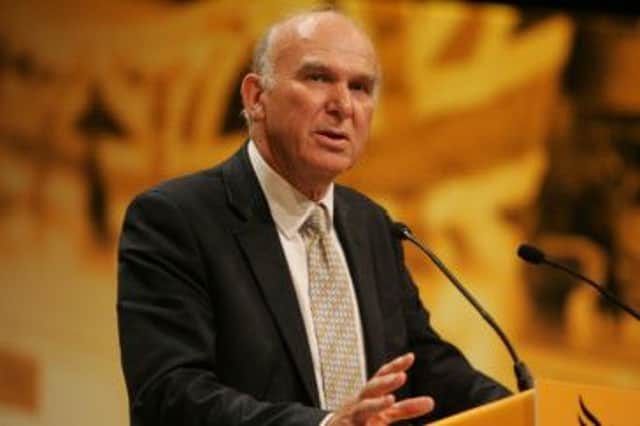Vince Cable orders Grangemouth union probe


Business Secretary Vince Cable said he was setting up a major review of industrial law, in a move that might result in a ban on “extreme tactics” employed by warring sides in disputes, such as the one that brought Scotland’s only oil refinery to its knees last month.
The inquiry could outlaw the controversial practice of “leverage”, direct action against firms, which in Grangemouth led to protests taking place outside the homes of senior company managers.
Advertisement
Hide AdAdvertisement
Hide AdBut it will also be aimed at hardline tactics employed by firms such as blacklisting, ministers indicated. This practice has led to some workers being frozen out and left unable to get a job because of their trade union activism or for having queried conditions.
The UK government last night confirmed the review was being set up as a direct result of the Grangemouth scare. It saw owner Ineos and the union Unite engaged in a bitter stand-off which, at one stage, threatened to shut the vital refinery and petrochemical plant, with the loss of as many as 13,000 jobs.
The union was forced into a climbdown, which kept the plant open, but the crisis has cast a deep shadow over the future of industrial relations.
At the time, Prime Minister David Cameron launched a fierce attack on Unite over the “leverage” strategy. It is understood Downing Street insisted that, as a consequence, a review take place, with a view to banning intimidatory tactics.
Cable said last night: “Generally speaking, industrial relations are on a good footing in the UK and have been for over two decades. The current strike rate is also at a historic low. Good workforce relations are key to the success of British industry and, therefore, to economic recovery.”
He added: “There were clearly some very serious matters going on in Grangemouth. That is why I have agreed to a proportionate and rational review of industrial disputes, including leverage and other tactics used by both unions and employers. There will be representatives from both sides on the independent panel, which will be chaired by a reputable QC with experience of working with both employees and employers.”
He went on: “There are rogue unions but there are also rogue employers, some of whom have in the past engaged in illegal tactics like blacklisting. This government will tolerate neither.”
The review, to be led by an independent panel and chaired by a senior QC outside government, will look specifically at disputes that centre on “critical industrial infrastructure” in the UK. Grangemouth is Scotland’s only oil refinery and its closure had the potential to cripple the sector in Scotland and the north of England.
Advertisement
Hide AdAdvertisement
Hide AdMinisters say they cannot sit back in such cases, given the fact that relations between union and employer have consequences for the national economy.
The terms of reference, released last night, also confirm that it will look at the “alleged use of extreme tactics in industrial disputes, including so-called ‘leverage’ tactics, and whether the response in terms of law enforcement has been appropriate”.
In a clear warning to both sides, the review will also examine “the effectiveness of existing legislation to prevent inappropriate or intimidatory actions in trade disputes” – wording which points to a new legislative crackdown.
However, the review into leverage will be fought by Unite, which last week staunchly defended its tactics in Grangemouth, saying it had been the subject of a smear campaign.
A spokeswoman for the union said last night: “This review is a sorry attempt by the coalition to divert attention from the cost-of-living crisis. Vince Cable may not have noticed, but the Grangemouth dispute has been settled.
“This review is nothing more than a Tory election stunt, which no trade unionist will collaborate with.”
Unite general-secretary Len McCluskey last week defended the leverage tactic. “The silent, peaceful protests in the leafy suburbs of a few directors are part of our basic human rights, which include freedom of expression. They are as old as democracy – free speech and the right to peacefully demonstrate. This union is not retreating from leverage, or from the right to peaceful protest.”
However, Jim Ratcliffe the founder of Ineos, has claimed that: “It is misplaced for unions in Britain to think that we are the enemy. We are not.
“It is not necessary, nor appropriate, to sow dissent and misrepresent employees or constantly to threaten industrial action.”